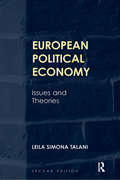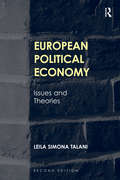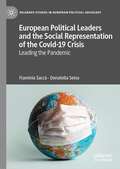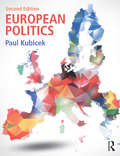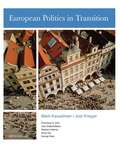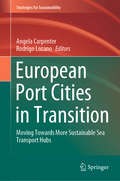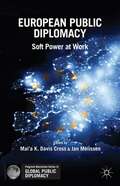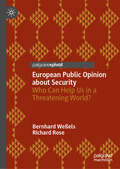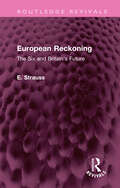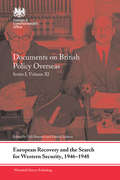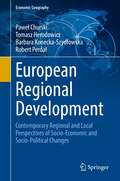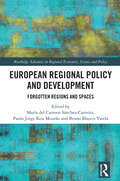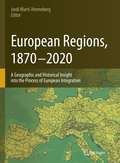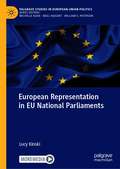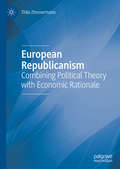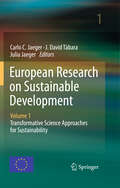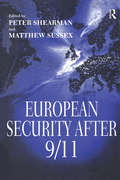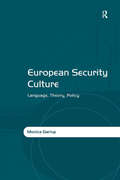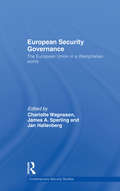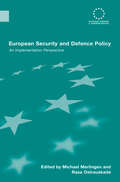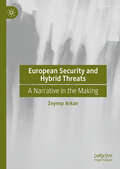- Table View
- List View
European Political Economy: Issues and Theories
by Leila Simona TalaniAs with the previous version (Ashgate 2004), this second edition is divided, for didactic purposes, into two parts. The first part provides an overview of political science approaches to European political economy, both mainstream and critical ones. As such, it contributes directly to the current debate among scholars of political science and international political economy concerning the nature of the process of European integration. The second part provides alternative explanations of some European economic policy events - the ECB, banking regulation, fiscal co-ordination, the crisis of the euro-zone, social policy and unemployment - allowing the reader to assess the explanatory value of competing approaches.
European Political Economy: Issues and Theories
by Leila Simona TalaniAs with the previous version (Ashgate 2004), this second edition is divided, for didactic purposes, into two parts. The first part provides an overview of political science approaches to European political economy, both mainstream and critical ones. As such, it contributes directly to the current debate among scholars of political science and international political economy concerning the nature of the process of European integration. The second part provides alternative explanations of some European economic policy events - the ECB, banking regulation, fiscal co-ordination, the crisis of the euro-zone, social policy and unemployment - allowing the reader to assess the explanatory value of competing approaches.
European Political History 1870–1913 (The International Library of Essays on Political History)
by Thomas MergelThe period from 1870 to 1913 saw the emergence of modern mass politics. The extension of the franchise, the development of party structures and political cleavages and growing state intervention mark this period as one of substantial political change. This collection brings together a selection of the most important recent research in this field.
European Political Leaders and the Social Representation of the Covid-19 Crisis: Leading the Pandemic (Palgrave Studies in European Political Sociology)
by Flaminia Saccà Donatella SelvaEuropean leaders faced the Covid-19 pandemic by adopting very different leadership styles, characterized by diverging approaches to crisis communication, power management, and relationship-building with actors and stakeholders in the public sphere. The pandemic also highlighted the importance of the already-existing cleavage between populism and technocracy, positioning it at the centre of the political scene.These complex circumstances required a multidisciplinary perspective grounded in political sociology and communication studies. To address these issues, this book analyses the communication and leadership styles of seven European leaders, grouped into ‘political families’. It analyses the cases of Angela Merkel and Erna Solberg to understand if and how female leaderships differentiated from their male counterparts. It then analyses the relationship between techno-populism and professional politics by comparing the cases of Giuseppe Conte, Emmanuel Macron and Pedro Sanchez. Finally, it focuses on populist leaders Boris Johnson and Victor Orbán, who represent emblematic cases with opposite outcomes.
European Political Parties and Party Finance Reform: Funding Democracy?
by Wouter WolfsThis book provides a comprehensive overview of the party finance regime at the level of the European Union. Based on an in-depth analysis of the interaction between European political parties and their institutional environment, it shows how the Europarties have coped with – and altered – the funding rules. The book explains why increasing party subsidies have been made available, and why considerable differences exist in how Eurosceptic and pro-European parties have used their EU funding. It also examines how party finance reform at the EU level has been at the centre of party competition, by demonstrating how the rules were strategically changed to benefit some European parties over others. Considering the strong democratic aspirations that lay at the origins of the finance regime, the book explores its consequences for party democracy and the rule of law in Europe. This book is valuable for scholars working on the European Parliament, Eurosceptic parties, EU decision-making, (European) party politics and political finance.
European Politics
by Paul KubicekEuropean Politics surveys the history, institutions, and issues that are essential for understanding contemporary European politics. Exploring a central question—"what is Europe?"—this text's thematic approach helps students compare politics in individual countries and see the political big picture in the region. European Politics examines not only countries already in the European Union but also those eligible to join to give students the most comprehensive picture of Europe's evolution in a globalized world. Key changes for the new edition: Fully revised and updated to include coverage of recent elections, public opinion data and key topics such as refugees, Russia and Ukraine, Syria, more on the economic crisis, and Brexit; Expanded and revised opening chapter explaining Europeanization, multi-level governance, and the fissures in Europe; Greater and updated coverage of theory, multi-culturalism, and the EU. This timely, in-depth text will be essential reading for anyone interested in European politics.
European Politics
by Paul KubicekEuropean Politics expertly and accessibly surveys the history, institutions, and issues that are essential for understanding contemporary European politics. Exploring a central question—"what is Europe?"—this text's thematic approach helps students compare politics in individual countries and see the political big picture in the region. European Politics examines not only countries which are (or were) in the European Union but also those eligible to join, to give students the most comprehensive picture of Europe's evolution in a globalized world. Key changes for the new edition include: coverage of hot topics such as Brexit, Covid-19, rise of nationalist-populists, authoritarian developments in Hungary, Poland, and Turkey, separatism in Catalonia, refugees/migrants, environmentalism, Ukraine, Russia, US-European relations, recent elections, and security threats emanating within Europe and beyond; a consolidated presentation on the European Union; fully updated data and examples; and a new concluding chapter recapping the main ideas and suggesting scenarios for the European project moving forward. This timely, in-depth text will be essential reading for anyone interested in European politics.
European Politics In Transition
by Mark Kesselman Joel Krieger George Ross Christopher S. Allen Joan Debardeleben Stephen Hellman David OstThis comprehensive text offers a stimulating introduction to the political systems of post-World War II Europe. The Sixth Edition uses a region-by-region approach, focusing in turn on Great Britain, France, Italy, Germany, Russia, Eastern Europe, and the European Union. Four themes unify the text and illustrate the concept of politics in transition within each region on a global level: economic management; the relationships between countries; the challenges of democracy; and the political impact of social diversity. Standard, in-depth treatment of each region is organized around five topics: the making of the modern state; political economy and development; governance and policy-making; representation and participation; and politics in transition. Within these topical areas, highly relevant issues from politics today include the impact of Muslim immigrants on European society, Europe's socioeconomic malaise, global warming, the war on terror, and the continuing evolution of European-American relations since 9/11, among other pertinent matters.
European Port Cities in Transition: Moving Towards More Sustainable Sea Transport Hubs (Strategies for Sustainability)
by Angela Carpenter Rodrigo LozanoSeaports, as part of urban centers, play a major role in the cultural, social and economic life of the cities in which they are located, and through the links they provide to the outside world. Port-cities in Europe have faced significant change, first with the loss of heavy industry, emergence of Eastern European democracies, and the widening of the European Community (now European Union) during the second half of the twentieth century, and more recently through drivers to change including the global Sustainable Development Agenda and the European Union Circular Economy Agenda.This book examines the role of modern seaports in Europe and consider how port-cities are responding to these major drivers for change. It discusses the broad issues facing European Sea Ports, including port life cycles, spatial planning, and societal integration. May 2019 saw the 200th anniversary of the first steam ship to cross the Atlantic between the US and England, and it is just over 60 years since the invention of the modern intermodal shipping container – both drivers of change in the maritime and ports industry. Increasing movements of people, e.g. through low cost cruises to port cities, can play a major role in changing the nature of such a city and impact on the lives of the people living there. This book brings together original research by both long-standing and younger scholars from multiple disciplines and builds upon the wider discourse about sea ports, port cities, and sustainability.
European Public Diplomacy
by Jan Melissen Mai’a K. Davis CrossDo the various aspects of Europe's multi-leveled public diplomacy form a coherent overall image, or do they work against each other to some extent? European Public Diplomacy pushes the literature on public diplomacy forward through a multifaceted exploration of the European case.
European Public Opinion about Security: Who Can Help Us in a Threatening World? (Palgrave Studies in European Union Politics)
by Richard Rose Bernhard WeßelsThis book&’s aim is to determine empirically whether Europeans see their multiple security needs best advanced by a consistent reliance on the EU&’s security policies or by differentiating allies according to their capacity to deal with different types of security threats, economic, military, and climate change. It uses original survey data to test whether people see their country facing multiple threats to their security. If they see a threat, do they want their national government to seek help from the EU, the United Nations or NATO or have their national government look after national security on its own? Given substantial differences in public opinion, we test whether this is due to individual differences in their political attitudes and social characteristics; national context; or differences in the capacity of multi-national institutions. The results have important implications for the public policies of national governments and the EU and for theories of European integration.
European Public Spheres
by Thomas RisseThe euro crisis has led to an unprecedented Europeanization and politicization of public spheres across the continent. In this volume, leading scholars make two claims. First, they suggest that transnational crossborder communication in Europe has been encouraged through the gradual Europeanization of national as well as issue-specific public spheres. Second, the politicization of European affairs - at the European Union (EU) level and in the domestic politics of member states - is inevitable and here to stay. Europeanized public spheres, whether elite media, mass media, or social media such as the internet, provide the arenas in which the politicization of European and EU issues takes place. European Public Spheres explores the history of these developments, the nature of politicization in the public spheres as well as its likely consequences, and the normative implications for European public life.
European Reckoning: The Six and Britain's Future (Routledge Revivals)
by E. StraussOriginally published in 1962 this book advanced the debate about the Common Market and its implications for Britain by a significant step. It traces the growth of the Community during the crucial first stage of its existence in all its main aspects – tariffs and finance, competition, services and transport, labour and agriculture. There is an original assessment of the effects of the Great Boom of 1959-1961 on the EEC and vice versa. Detailed trade figures are used as a guide to the changing relations between the Six, highlighting the pivotal role of Germany. A short review of the problems of the associated territories and the attraction of the EEC to its neighbours leads up to the central issue of Britain’s European dilemma.
European Recovery and the Search for Western Security, 1946-1948: Documents on British Policy Overseas, Series I, Volume XI (Whitehall Histories)
by Patrick Salmon Gill BennettThis volume documents the British Government’s response from mid-1946 to early 1948 to the twin challenges of economic recovery and the search for a meaningful Western security framework in the face of the increasing polarisation of Europe into Eastern and Western spheres of influence. Although relations between the wartime Big Three allies, the UK, US and USSR, had begun to fracture even before the end of hostilities in 1945, it was during 1947 that the postwar division of Europe became sufficiently alarming to prompt decisive action, under American and British leadership, to promote European economic reconstruction and thereby increase Western security. American leadership took the form of two initiatives, enabled by US economic and military strength: the Truman Doctrine for aid to Greece and Turkey, announced in March 1947, and the Economic Recovery Programme or Marshall Plan, first proposed in June 1947. British leadership, under the personal direction of Foreign Secretary Ernest Bevin, was shown in two ways: in articulating Western Europe’s need for US help in a way that enabled it to be recognised and then accepted; and in helping to coordinate the European response to the US initiatives to maximise their effectiveness. Documentation on the Truman Doctrine and Marshall Plan forms the core of the volume, but a wide range of material, including intelligence-related documents, has been chosen to illustrate the multiple challenges faced by the Attlee Government during this period. This book will be of much interest to students of British politics, Cold War History, European History and International Relations.
European Regional Development: Contemporary Regional and Local Perspectives of Socio-Economic and Socio-Political Changes (Economic Geography)
by Paweł Churski Tomasz Herodowicz Barbara Konecka-Szydłowska Robert PerdałThis book offers a comprehensive overview of contemporary issues of regional development. It places particular emphasis on its socio-economic and socio-political determinants which accompany the problem of existing and ever-widening differences in the level of regional development in various parts of Europe. In order to diagnose the scale of those differences and to indicate the main forces behind the divergence of development, the authors propose an original systematisation of regional development factors, drawing attention to the need to consider them within the framework of present-day socio-economic megatrends. The proposed approach to the development factors is also used for the author's operationalisation of the concept of territorial capital, which is at the centre of regional place-based policy. The wide spatial aspect of the analysis (national and local) and its extensive temporal scope (2004-2019) yields unique results and creates an important element of added value for this book, which shows the regularities of the process of regional development in Europe at three spatial levels - pan-European, national and intra-regional. Furthermore, it indicates the challenges faced by regionalists who attempt to carry out research on different territorial levels with a diverse number of units (205 EU regions, 16 Polish voivodeships, 2,478 Polish local units) and extended observation periods (2004-2017). The solutions proposed by the authors, who show the potential of overcoming the barriers resulting from limited access to complete and comparable statistical data series, should be inspiring for many researchers. The unique results of direct research carried out on a large sample of respondents and entrepreneurs via diverse field research techniques constitute a valuable source of information on local conditions that impact contemporary development processes in less developed regions. Their value is even greater because they were carried out in a unique laboratory created by the authors for testing the regularity of formation and impact of socio-economic development factors in various locally determined conditions of this process. It consists of purposefully selected test units (LAU2). Located in a less developed region, they represent all growth types and functional test units identified in the course of the research. Consequently, the results obtained may be generalised and applied to other areas showing similar features of territorial capital. The monograph is addressed primarily to a wide group of regionalists connected with economic and social sciences as well as to practitioners involved in the implementation of development policies at various levels.
European Regional Policy and Development: Forgotten Regions and Spaces (Routledge Advances in Regional Economics, Science and Policy)
by María del Carmen Sánchez-Carreira Paulo Jorge Reis Mourão Bruno Blanco-VarelaThe shortcomings of traditional regional policies led to a major policy. Thus, regions have become more active in the design and implementation of policies, following a bottom-up approach and involving the participation of the local community in strategic planning, as opposed to the traditional top-down method. This book addresses regional development theories and policies, with a special focus on forgotten places, and raises emerging questions about recent theoretical advances, as well as trends and challenges in the field. It examines two main and related issues: the crucial role of regional actors for development and the role of Forgotten Spaces. It emphasizes the spatial/territorial approaches from different theoretical perspectives, underlining place-based approaches and compares the experiences of both successful and failed cases, attempting to identify lessons and policy recommendations, as well as adding empirical evidence to this field. The different cases presented, which focus on Forgotten Spaces, allow the reader to assess the role of different actors for regional development as well as some sectoral approaches. While there is a clear focus on European countries with different geographical, institutional and sociocultural characteristics, the book also examines good and bad examples of regional development and policies related to forgotten places from different regions worldwide, including developed and developing countries. The book benefits from contributions from over 20 authors from different nationalities, and a rich diversity of case studies, approaches and methods of discussion. The authors discuss practical examples and more complex theoretical approaches, involving techniques of spatial analysis, spatial econometrics, social networks, content analysis as well as regional planning techniques. The book will appeal to an interdisciplinary audience and will provide academicians, politicians, and policy designers with original and detailed analyses.
European Regions, 1870 – 2020: A Geographic and Historical Insight into the Process of European Integration
by Jordi Martí-HennebergThis volume explains the national and regional border modifications that took place in Europe from 1870 to 2020. It provides insights that allow us to understand boundary changes for several different levels of territorial organization. The text describes the state formation process related to the regional-administrative structures in each European country, and offers insight into the degree of centralization historically by describing the extent of legislative autonomy at different administrative levels and the competences reserved for each of them. The book sheds light on the complex regional organization of Europe and the difficulties its reform has faced. The main audience will be academics and PhD/Masters students working in a variety of geography fields, and the maps included in each chapter will also be of interest to a broader audience including undergraduate and secondary-school students wishing to better understand the political history of Europe.
European Representation in EU National Parliaments (Palgrave Studies in European Union Politics)
by Lucy KinskiThis book provides an original argument that rejects the idea of national MPs having but one ‘standard’ mode of representation. It acknowledges the national electoral connection, but considers representation beyond national borders. The author empirically investigates such patterns of representation in MPs’ parliamentary speech-making behavior and their attitudes in Austria, Germany, Ireland and the UK. The book analyzes representative claims in parliamentary debates on the Constitutional Treaty, the Lisbon Treaty and the Eurozone crisis, and relies on qualitative interviews with members of the European affairs and budget committees. It finds a Eurosceptic Europeanization in that national MPs from the Eurosceptic left particularly represent other EU citizens.
European Republicanism: Combining Political Theory with Economic Rationale
by Thilo ZimmermannThis book presents current theories of European integration, such as federalism, neo-functionalism and liberal intergovernmentalism with their strengths and weaknesses. It is then argued that the combination of republican theory with public good theory, the res publica of public goods, could better explain European integration. Public good theory has, however, to be adopted in order to make it applicable to European republicanism. Finally, the book demonstrates how this new framework can influence further academic debates, such as on sovereignty and monetary integration, externalities of a common European market and the driving force of European integration. It is maintained that as the republican approach does not follow a pure economic logic, there remains space for political considerations and motivations.In this topical and interdisciplinary book, the author combines many important strings of European integration theory, history, economics and political sciences, which are clearly brought together into a coherent analytical discourse. Its strength is the interdisciplinary interaction between politics and economics, as well as theoretical and practical issues which are of high relevance for public debate in Europe. This book will be of interest to scholars and students interested in economic integration, as well as history and political philosophy.
European Research on Sustainable Development
by J. David Tàbara Carlo C. Jaeger Julia JaegerThis book provides the reader with a state-of-the-art view of research on sustainable development. Its emphasis lies on the transformative dimension of this research: sustainable development can only be realized through a far-reaching transformation of the situation humankind finds itself in at the beginning of the third millennium. The contributions are written by leading world experts in the conceptualisation and actual practice of sustainable development. The book provides a timely overview of ideas and methods as well as a variety of original learning examples on the most innovative approaches on sustainability science.
European Security After 9/11
by Matthew SussexMuch scholarly attention has been paid to the United States' response to the events of 9/11. This timely volume broadens our understanding of the impact of the attacks by considering instead their consequences for European security and for the relationship between the US and leading European states. The book places into theoretical context the notion that the world changed by assessing shifting conceptions of security and warfare, linking this to new thinking in these areas. It also critically evaluates the idea that the war against terrorism is a manifestation of a cultural clash between the West and Islam, and provides detailed evaluations of British, French, German and Russian reactions to 9/11 and the subsequent war on Iraq. Bringing together an impressive collection of experts this work will be an excellent resource for courses on international security, European politics, and international relations.
European Security Culture: Language, Theory, Policy
by Monica GariupGrounded on tenets of cultural realism and social constructivism, Monica Gariup develops a theoretical framework to enhance our understanding of security culture at the European Union level. She employs tools from political theory, linguistic analysis and international relations theory to examine the implications of discourse and practice in European Security and Defense Policy (ESDP). Innovative in scope, the volume analyzes whether elaborating a structurationist solution and proposing a discursive syntax of security makes it possible to identify and compare different types of security actors. Providing a comprehensive and objective analysis on the links and implications between the discourse and actual policy of the ESDP, this is essential reading for scholars and researchers in European politics, international relations, security and cultural studies.
European Security Governance: The European Union in a Westphalian World (Contemporary Security Studies)
by Charlotte Wagnsson James Sperling Jan HallenbergThis book focuses on the problems of, and prospects for, strengthening the global system of security governance in a manner consistent with the aspirations and practices of the EU. The EU approach to security governance has been successful in its immediate neighbourhood: it has successfully exported its preferred norms and principles to applicant countries, thereby 'pacifying' its immediate neighbourhood and making all of Europe more secure. The EU governance orientation ultimately seeks to enlarge the European security community and expand the geopolitical area within which armed conflicts are inconceivable, and where state and private actors converge around a set of norms and rules of behaviour and engagement. The EU's success along its immediate boundaries has not yet been replicated on a global scale; it remains an open question whether the EU system of governance can be exported globally, owing to different normative structures (for example, a tolerance of armed conflict or non-democratic governance internally), great-power competition (such as US--China), or ongoing processes of securitization that has made it difficult to find a commonly accepted definition of security. Moreover, the EU system of security governance clashes with the continuing unwillingness of other major powers to cede or pool sovereignty as well as varying preferences for unilateral as opposed to multilateral forms of statecraft. This edited volume addresses both the practical and political aspects of security governance and the barriers to the globalization of the EU system of security governance, particularly in the multipolar post-Cold War era. This book will be of great interest to students of security governance, EU politics, European Security and IR in general. James Sperling is Professor of Political Science at the University of Akron, Ohio, USA. Jan Hallenberg is Professor of Political Science at the Department of Security and Strategic Studies, Swedish National Defence College. Charlotte Wagnsson is Assistant Professor in the Department of Strategic and Security Studies at the Swedish National Defence College.
European Security and Defence Policy: An Implementation Perspective (Routledge Advances in European Politics)
by Michael Merlingen Rasa OstrauskaiteSecurity and defence is the area in which the EU has advanced most in recent years. A principal element of this process is the proliferating number of military and civilian crisis management missions in Europe, the Middle East, Africa and Asia. Clearly, Europe has come a long way since the disappointments and frustration in the 1990s, when, in light of the violent disintegration of Yugoslavia, analysts argued that the EU foreign and security policy was ‘neither common, nor foreign, nor dealing with security, nor (could) be called a policy.’ Since then the newly developed European Security and Defence Policy (ESDP) has become the necessary framework for the formulation and implementation of effective European security policy. This book is the first-ever in-depth inquiry of the ESDP in action. It analyzes the implementation of military and civilian missions in the Balkans, Southern Caucasus, Africa and Asia and asks what impact they have on the ground. The EUJUST Themis in Georgia, the Aceh Monitoring Mission in Indonesia as well as EUSEC-R.D. Congo and EUPOL Kinshasa are examined in The European Security and Defence Policy will be of interest to students and scholars of international relations, security, European studies, foreign policy, peacekeeping and transatlantic relations.
European Security and Hybrid Threats: A Narrative in the Making
by Zeynep ArkanHybrid threats have been defined in various ways by different security actors, with their scope continuously expanding to encompass emerging insecurities within the evolving security environment. As an umbrella term encompassing a wide spectrum of threats with complex and multidimensional features, the notion of hybrid threats remains inherently vague and amorphous. This lack of clarity presents significant challenges for policymakers, who must constantly identify potential dangers, anticipate risks, and formulate effective responses to safeguard their polities and populations. Consequently, a persistent sense of insecurity has become a defining characteristic of the current European security landscape. This &‘new normal&’ of European security is characterised by a series of &‘(un)known unknowns&’ that fall under the elusive concept of hybrid threats. However, rather than accepting this evolving security paradigm at face value, this study calls for a critical examination of its underlying assumptions, core concepts, and broader political implications. It argues that the hybrid threat narrative demands a re-evaluation of what security means in contemporary Europe and how it is operationalised. Moreover, the study underscores the expansive nature of the hybrid threat framework, which has the potential to include virtually any domain – ranging from education and technology to research and public infrastructure – thereby contributing to the securitisation of all aspects of social and political life. This expansive and ambiguous framing raises important questions about the limits of security and allocation of resources, carrying considerable implications for democratic governance in Europe. Dr Zeynep Arkan<span lang="EN-GB" style="font-size: 11.0pt; mso-ascii-font-family: Calibri; mso-ascii-theme-font: minor-latin; mso-fareast-font-family: 'Times New Roman'; mso-hansi-font-family: Calibri; mso-hansi-theme-font: minor-latin; mso-bidi-font-family: Calibri; mso-bidi-theme-font: minor-latin; color: #1f3864; mso-themecolor: accent1; mso-themeshade: 128; mso-ansi-language
